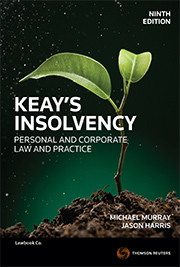Books, articles, commentary
Does Political Criticism of Judges Damage Judicial Independence?* a paper by Dyson Heydon
17/03/2018
newspapers Books, articles, commentary Case law Courts
This is the title of a recent article written by Dyson Heydon AC QC on contempt of court, with a ...
An economic perspective on trends in start-ups, and -downs
The federal government’s Innovation Statement of 2015 contained some simplistic aims for the promotion of entrepreneurial activity from proposed changes ...
A History of Australian Legal Education, by David Barker
I was pleased to have attended the recent book launch of A History of Australian Legal Education written by my ...
Where’s an economist when you need one?
12/10/2017
OECD phoenix activity Regulators Statistics
R3 in the UK has commented on a recent OECD Report, about which we gave some views when it came ...
Codes of conduct
04/10/2017
General Insolvency profession Law reform New Zealand
Codes of conduct need to remain in step with on-going changes in the commercial and business worlds in which they ...
Keay – phoenix reforms
29/09/2017
phoenix activity Books, articles, commentary General Keay
It is good to see that that several reform issues raised in my and Jason Harris’ textbook, Keay’s Insolvency, appear ...
Safe harbour – some inherent behavioural issues to overcome
While the new safe harbour law[1] is the end result of some years of torturous debate, still on-going, it is ...
“The human importance of bankruptcy”
07/08/2017
bankruptcy Books, articles, commentary Case law
The significance of bankruptcy and the need for its law to be clear and predictable is emphasized in a recent judgment of the ...
Black Economy Taskforce: Consultation Paper
The Black Economy Taskforce has released a discussion paper outlining a number of additional policy ideas which draw on its ...
OECD report – “low personal costs to entrepreneurial failure with high barriers to restructuring”
26/07/2017
Books, articles, commentary Economics international
Economic analyses of insolvency in Australia are strangely limited, given that a major purpose of an insolvency regime is its support of ...
International insolvency regulation – London 2017
18/07/2017
Insolvency profession International Association of Insolvency Regulators AIAR Law reform UK insolvency
The annual meeting of the International Association of Insolvency Regulators, IAIR, is being held in London, from 4 to 7 ...
England’s review of its insolvency code – independence, remuneration and more
The question of insolvency practitioner independence is important given the role of a company liquidator and bankruptcy trustee. Independence rules ...
NZ accountants’ new Code obligations, with Australia close behind
17/07/2017
New Zealand NOCLAR safe harbour Australian Academy of Law
Accountants in New Zealand, including those who are insolvency practitioners, are from this week required to refer relevant breaches of ...
Director charades continued
12/07/2017
director identity number Law reform AFSA ASIC
After giving directors the benefit of protection from liability for insolvent trading, through the ‘safe harbour reforms’, the government has ...
Protocol for International Recognition of Insolvency Proceedings Affecting Natural Persons
11/07/2017
Law reform MSME bankruptcy Books, articles, commentary
As INSOL International explains, this Protocol of June 2017 is a project that has been completed by members of the ...
The AAT strikes back
19/06/2017
AAT Books, articles, commentary Case law newspapers
Mr Dutton, the immigration minister, has been found wanting in refusing an application by a Mr Singh for a 6 week bridging ...
Accountants and NOCLAR – more than a systems update
Professional accountants in Australia will soon be bound by a new standard that could require them to report offences to ...
Is the end result of Sakr Nominees continued “institutionalised time billing”?
While the insolvency profession might be satisfied with the final approval given to the liquidator’s remuneration, by Justice Ashley Black, in Sakr ...
Penalising insolvent companies – a King Charles I comparison
Regulators seeking penalties against companies in liquidation often reveal, as I have recently commented,[1] some serious signs of frustration that ...
Australia today
22/05/2017
Books, articles, commentary Dutton Refugee law
“… Nazi troops responded to this secret emigration campaign by inspecting all Danish boats, using specially trained dogs to sniff out ...
“Straw directors”? no kidding!
The federal government is putting through laws that would give directors of companies greater latitude to incur debts that cannot ...
Challenges to trusts by bankruptcy trustees – New Zealand law reform
15/05/2017
Books, articles, commentary Case law New Zealand sham
A recent change to the New Zealand Insolvency Act 2006 (Schedule 1, new para (x)) has given power to the ...
NSW mines and their potential environmental impacts
In the context of the recent intersections between environmental protection laws and insolvency laws, in relation to CORA laws and Linc ...
INSOL’s Directors in the Twilght Zone – Australia’s “medium risk” for its directors
INSOL International has released the 5th edition of its excellent review of the international laws regulating director conduct in the ‘twilight ...
Categories
Main Menu
























